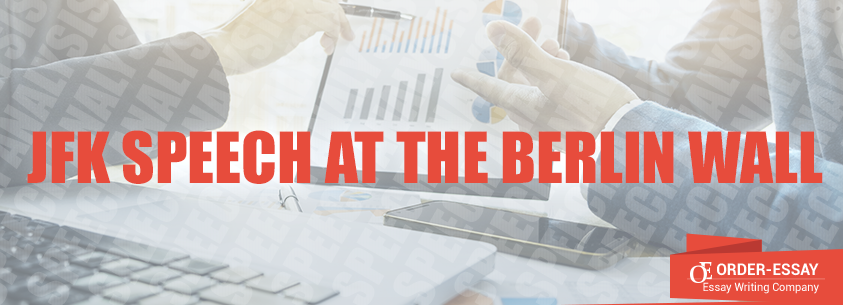
Kennedy’s speech is considered to be one of the best speeches in the history of the American society and a turning moment in the Cold War. Kennedy’s speech was also a key episode in relations between the U.S. and USSR during the Cold War. The speech focused on the possibilities of raising morale among West Berliners who lived in almost complete isolation from East Germany and were afraid of possible occupation. Kennedy’s speech was focused not only on these people, but also on all the citizens of Berlin. Hence, basic assumptions of Kennedy’s speech concentrated on the American democratic values and justice, especially for West Berliners, which were opposed to the values and beliefs of the USSR.
In June 1963, President John F. Kennedy visited five Western European countries to promote goodwill and strengthen unity among the allies of America. His first stop was Germany, the country which was involved in the world conquest under the dictatorship of Adolf Hitler 20 years before Kennedy’s visit. After Germany’s defeat in World War II, the country was divided in half, with East Germany under the Soviet control and West Germany being a democratic country in the alliance with the U.S. In 1961, the government of East Germany under Walter Ulbricht erected barbed wire barrier around West Berlin, which officially was called as “anti-fascist protective barrier.” The authority declared that the goal of the barrier was to prevent the infiltration of spies and agents from West Germany. However, this border was generally known as the Berlin Wall, and the real goal was to keep East German citizens from escaping to the West. The wall was rebuilt in one month using concrete, and the buildings were demolished to build a “zone of death.” The Wall was called the Iron Curtain, because Berlin became a transit zone from Eastern to Western Europe.
Need custom written paper? We'll write an essay from scratch according to your instructions!
Plagiarism and AI Free
Price from only 10.99$/page
Call Now
Start Chat
Order Now
Kennedy’s speech reflected the ideological confrontation between the United States and the Soviet Union during the Cold War. Kennedy had met Nikita Khrushchev in Vienna before he declared his speech. Two world leaders had to agree on trust between countries, but it did not work out. Moreover, it also increased tension between them, particularly in the discussions about the divided city of Berlin. Thus, the speech mirrored a very difficult historical situation in which Berlin and the entire Europe were engaged in the early 60s. Kennedy arrived to West Berlin and delivered his speech in connection with the construction of the wall that divided the city into two parts. As it has been already mentioned, the wall was necessary for the authorities of the German Democratic Republic in order to prevent a mass exodus of East Germans to the West. In turn, Kennedy aimed to support the residents of Berlin caught up in a divided city, as well as use the situation for propaganda purposes by demonstrating the totalitarian nature of the Soviet system using the example of the Berlin Wall.
Kennedy’s speech is an important historical episode, because it deepened the aggravation of the Cold War. In addition to the Cuban crisis, the Berlin crisis was also a crucial historical case which also clearly divided the world into two parts. Any small mistake in Berlin may turn into a nuclear Cold War. Kennedy allowed Khrushchev to build the Berlin Wall. Hence, East Germany was isolated from the West in a hope that the Kremlin understands the peaceful intentions of Washington correctly and thus will agree to bilateral cooperation, giving up the nuclear arms race. Instead of this intention, Khrushchev took it as a weakness, indecision, and even the cowardice of the American President. Therefore, the President’s speech was an attempt to express a clear U.S. position on Berlin and against the Soviet Union.
Kennedy’s speech also performed two important functions, namely support of East Berliners and declaration of democratic values. First, it was aimed at East Berliners who learned about the availability of support from the U.S. It was a true support for the unity of thousands of Germans. Kennedy tried to encourage people and to assure them that they were free citizens, and America would provide its support to them. His words “I am Berliner” raised the belief in human freedom. This phrase was repeated one more time at the end of his speech, and was greeted by a standing ovation of thousands. In fact, Kennedy’s speech was an entirely political manifest, and it was focused on potential allies in a possible World War III with the Soviet Union. Second, in his speech, Kennedy clearly declared central values of the democratic world, namely freedom, equality between races, and respect for all the citizens. Accordingly, such a position opposed the totalitarian regime of the USSR, where human rights were partially ignored.



While the immediate response from the West German population was positive, the Soviet authorities were less satisfied with this speech. Kennedy had spoken in a conciliatory tone just two weeks before, saying about the improved relations with the Soviet Union. In response to the Berlin speech by Kennedy, Khrushchev said later that he had not recognized the person who made the speech. It seemed, Khrushchev later added, that they were two different people. Obviously, Kennedy’s speech did not change the history, but once again showed the position of the President and the U.S. as well. Subsequently, the speech was cited many times in different shows, films, literature, and then became a common expression.
Get a Price Quote
In conclusion, Kennedy’s speech became a historical episode which diagnosed the nature of relations between the U.S. and the USSR. Kennedy in his speech supported Berliners who were in a difficult political situation. He stressed the full readiness of the U.S. to support democratic values, human rights, and justice. However, this speech was also focused on potential allies, and was orated in order to show a clear position on the policies of the USSR. Accordingly, the Soviet government did not accept Kennedy’s speech on which the next diplomatic development of relations between two main counties depended in that historical time. Consequently, Kennedy’s speech strained relations between the U.S. and the USSR, which later grew into the Cuban crisis.








